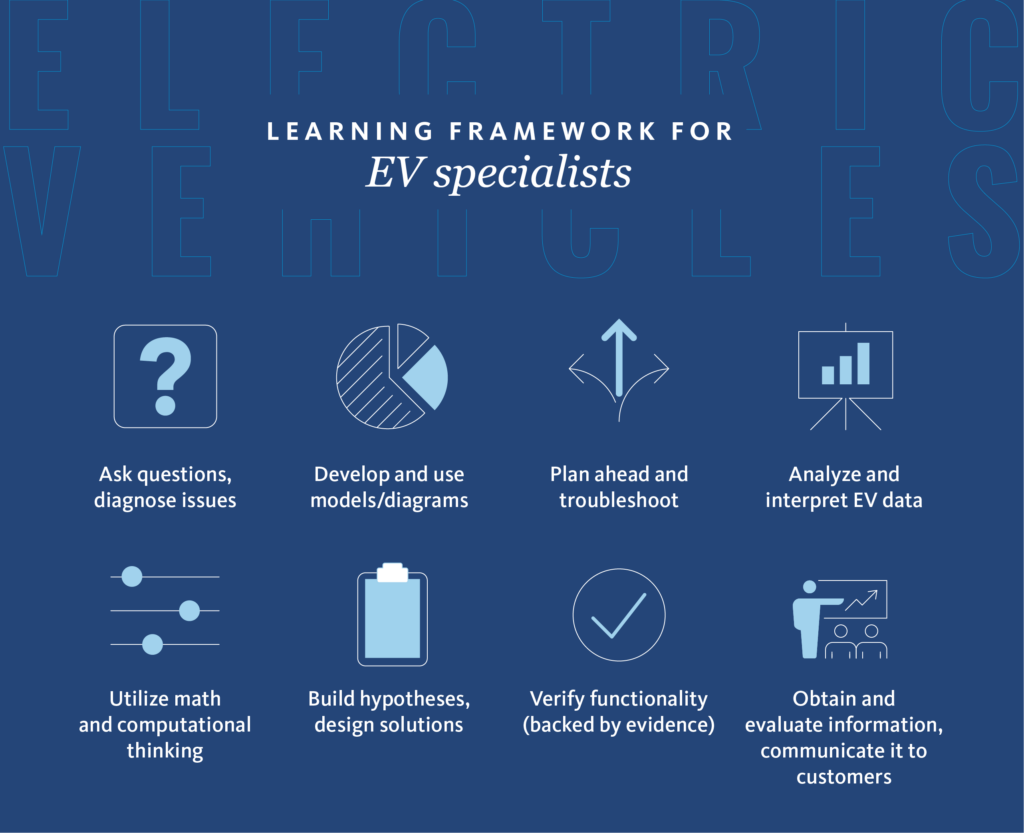Regardless of line of business, the way people learn and grow in their jobs is changing. Development is a valuable approach, going beyond training in preparing people for more than just the immediate requirements of work. Flexible learning encourages longer-term critical thinking, helps build resilience, and opens new pathways for growth.
As various industries rapidly change, up-to-date knowledge and skillsets must be taught to the workforce’s next generation to meet growing demands. Within the electric vehicle (EV) sector in particular, the development of standardized educational materials and an informed, highly trained workforce is of critical importance.
Establishing a competency standard for EVs
As innovative EV technologies continue to emerge, standardized safety and maintenance techniques must be established. Unlike those for internal combustion engine (ICE) vehicles, there are not yet recognized, standard best practices for estimators or technicians who may work on an EV — and more specifically, perform ICE to EV conversions.
The mounting importance of this conversation has been gathering steam. Legacy EV — an entity that’s part of Electric Vehicle Technician Education Council (EVTEC), the committee that developed and proposed the first-ever EV standards — has even been engaged in recent conversations with the administration on EV technology at the White House.
All the hardworking instructors that provide training on EV technician skills need a universal education task front to rely on for guidance, and manufacturers want standards for their products, as well. A standardized education system would support the regulations/standards in place across the globe, while enabling international collaboration and market growth in the EV space.
Training should be flexible, evolve continuously
Training is especially important due to the unique characteristics EVs possess. Specialized knowledge is required when working on things like advanced battery technologies and high-voltage systems. Without adequate training, technicians are unable to properly service not just the vehicles themselves, but they can’t easily adapt to every new technology, specialized car part or charging infrastructure that surfaces.
For repair shops, particularly small ones, it can be difficult and expensive to acquire and carry certain specialized parts, and new manufacturers routinely pop up with new models that need to be integrated into existing standards. Education and training should be reviewed and revised regularly.
The bottom line
For the widespread global adoption of EVs to succeed, there must first be a solid instructional foundation, and a well-trained workforce with an ever-evolving knowledge base at the ready to solve technical challenges, provide reliable services, and ensure customer satisfaction.
At Vale Training, whether it be fleet managers, insurers, estimators or repair facilities learning to implement high voltage and EV training and safety practices in their workplaces, or insurance adjusters learning to properly evaluate property damage following catastrophes, we aren’t just training people for today — we’re developing them for the future.

Learn more — Vale Training, a Sedgwick company, is equipping the next generation of claims specialists with the expertise necessary to meet industry challenges. Vale is part of the EVTEC board, has been training auto estimators for more than 70 years and introduced the EV and hybrid course several years ago to establish a standard for writing an EV estimate. Vale’s partnership with Legacy EV is specific to the technician audience. Visit the website to learn about the range of online courses, career consultancy services and certifications offered, including EV courses hosted in partnership with Legacy EV.

